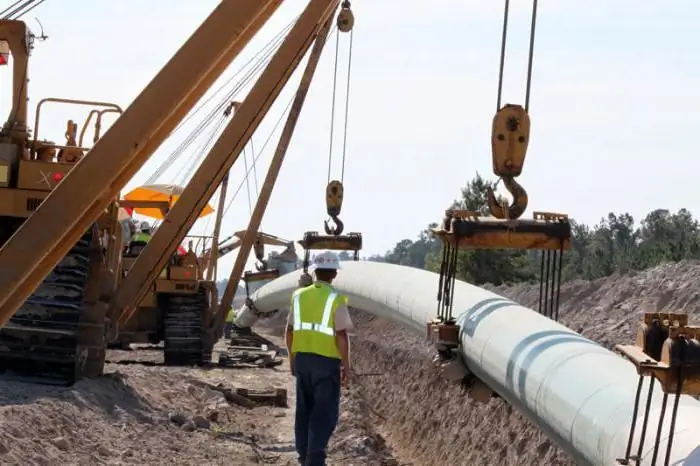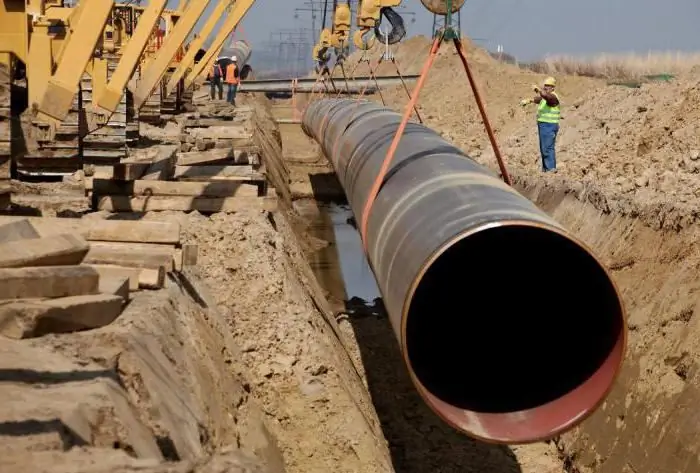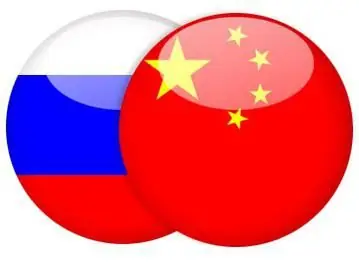2026 Author: Howard Calhoun | calhoun@techconfronts.com. Last modified: 2025-01-24 13:10:29
Russia and China have signed a grand contract for the supply of natural gas. The gas pipeline to China is expected to allow Gazprom to diversify exports, as well as contribute to further success in cooperation between the two countries.
Contract signed
At the end of May 2014, Russia and the People's Republic of China (represented by Gazprom and CNPC) signed an agreement on the supply of natural gas from our country. The document was signed when the President of the Russian Federation was on an official visit to China. The volume of the contract is $400 billion and its duration is 30 years. The annual volume of deliveries will be 38 billion cubic meters of gas.

This agreement is unique for Gazprom. The Russian company has never entered into such agreements with anyone else. Some experts believe that China received gas at a lower price (about $350 per thousand cubic meters), which suited Russia (we initially asked for 400). Together with the agreement between the two countries, a memorandum was signed on the priority of mutual understanding in the course of gas supplies. To fulfill the contract, a new gas pipeline from Russia to China will be built.
Tough road to signing
Just a few days beforesigning of a gas contract between Russia and China, various media reported that the negotiations had stalled, and no agreement could be concluded.

These theses, as some experts believe, had some validity - if only because a few years earlier attempts to conclude such an agreement between the Russian Federation and China were unsuccessful every now and then. Take, for example, the St. Petersburg Economic Forum in 2011: representatives of Chinese gas companies were at it, but did not reach an agreement with their Russian counterparts. The reason was the disagreement on price. Some experts believed that the Russian Federation offered gas twice as expensive as China could receive from other countries, in particular from the states of Central Asia. Therefore, the question of whether or not a gas pipeline from Russia to China will appear has remained relevant for a long time.
Gas contract: how will it affect relations between Russia and China?
The foundations of the strategic partnership between Russia and China were laid back in the 90s. In 2001, the states signed an agreement, according to which the building of good neighborly and friendly relations was to take place. In 2011, attempts were made to shift cooperation to a strategic plane, and this, some experts believe, preceded the current successes on the gas contract.

There is a version that the signing of the recent agreement is promising not only in terms of financial benefits for Gazprom, but also in terms of acquiring resources for the development of other industrieseconomies of both countries. It is planned to carry out several rounds of investments in infrastructure (for example, the construction of a bridge across the Amur), to finance projects related to tourism and social support for the elderly. Russian-Chinese cooperation may deepen in the regions, especially those where key elements of the gas pipeline will be laid.
Optimistic point of view
Some experts believe that the signing of a contract between China and Russia on gas supplies and an agreement that the construction of a gas pipeline to China will soon begin is an event of the greatest importance for the entire planet. It, analysts believe, will link the economies of both countries and bring many benefits to everyone. There is a version that both sides deliberately made concessions just to reach an agreement.

If it wasn't for this, the contract most likely wouldn't have been signed. Therefore, analysts believe, it is very important that Russia and China were initially set up for the result. There was a user survey on the website of a major Chinese newspaper. The question was: "What is more important for you - the very fact of signing an agreement between the Russian Federation and China or the economic benefit?" Most users chose the first option. Therefore, we can say that the PRC government to a certain extent reflected the interests of citizens. Also, analysts believe that the gas contract will help both countries to feel more confident in addressing development issues in the Asia-Pacific region. By building a gas pipeline to China, Russia will thus be able toincrease their own political weight as well.
A pessimistic point of view
There is a version among experts that it was unprofitable for Russia to sign a gas contract with China. Our country, according to supporters of this opinion, may have won something in terms of prices, but lost in terms of gas supply conditions. Here we are talking about the take or pay clause (which means “take or pay”), which Gazprom usually includes in its contracts. Experts believe that this clause might not have been included in the agreement signed between Russia and China.

This may lead to the fact that Russia, having built an expensive gas supply infrastructure, will face a reluctance to exploit it actively enough. The construction of a gas pipeline to China may thus be unprofitable. As a result, the government will be forced to look for funds to compensate for possible costs.
How the pipeline will go
It is assumed that the gas pipeline to China will be laid through the Altai region. If you look at the history of Russian-Chinese relations on the gas issue, it turns out that this model was considered back in the 90s. The gas pipeline project to China has existed for a long time. The issue was only in the price, but now that it has been resolved, experts believe, there is a possibility that the parties to the agreement will start laying pipes through Altai. The main characteristics of the pipeline are as follows. The length of the highway will be 2.6 thousand km, the throughput capacity will be about 30 billion cubic meters. This will allow the supply of gas fromoperating mining sites in the Yamal region. In addition to the Altai gas pipeline, China and Russia are planning to organize the delivery of fuel through another branch. It will consist of the Yakutia-Vladivostok section and a branch towards China near Blagoveshchensk. The development of the main field for this branch - Chayandinskoye - will be started, according to the plans of the two countries, in 2019. Many experts see this scheme of a gas pipeline to China as very thoughtful and effective.
How the contract will affect other markets
According to some economists, the agreement signed between Russia and China will not significantly affect gas relations between Gazprom and Europe. Largely because the EU countries in the near future may introduce the practice of energy saving and start consuming less gas. The contract between Russia and China, according to experts, did not become a special sensation, since such a turn of events, in principle, is quite logical against the backdrop of plans announced in previous years. And the Altai gas pipeline to China is not a new project at all.

Also, analysts say, there is no need to see a direct connection between sanctions against Russia because of the situation in Ukraine. Relations between the Russian Federation and the PRC, therefore, do not carry a pronounced political context. Some European experts are sure that Russia planned to sign a contract with China long before the current events in the foreign policy arena.
US Opinion
Some US analysts tend to question Russia's benefits from a gas deal with China that couldfor their own purposes to use the aspirations of the Russian Federation to become more protected from sanctions by Western countries. US experts believe that the price of the contract is not as clear as it seems: in their opinion, China will pay Gazprom less than, for example, European countries do. Based on this, Russia, according to analysts, nevertheless made concessions. And China, therefore, benefited from the signing of the contract - both in terms of price and in terms of the convenience of the location of the gas pipeline. In turn, the Americans believe that all that Russia has received is a chance to show Europe the possibility of diversifying gas supplies. In addition, analysts from the United States note that Russia is not inclined to consider an acceptable option when its economic dependence on China will be greater than on Europe. And this should be taken into account when building a gas pipeline to China, Gazprom.
Scope of contract
So, the gas pipeline to China will supply the Russian neighbor with gas in the amount of 38 billion cubic meters annually. Is it a lot or a little? Let us turn to the statistics concerning the structure of Russia's natural gas supplies to different countries of the world. In 2013, Gazprom exported 196 billion cubic meters of fuel through pipelines. This is the highest figure in seven years. The main buyers of Russian gas are non-CIS countries. In 2012, they purchased 138.8 billion cubic meters of fuel. Germany, Turkey and Italy became the main importers of Russian gas. In turn, 64.4 billion cubic meters of fuel were exported to the CIS countries and the B altic States in 2012. It turns out that the future volume of gas supplies to China is about 20% ofcurrent performance of Gazprom. The Chinese market could thus replace half of what the neighboring countries consume and more than a quarter from European buyers (based on 2012 figures). The question is how soon the same gas pipeline to China, through Altai, will be built.
Why does China need Russian gas?
Some experts are sure: China needs Russian gas no less than Russia needs exports. The main factors of this state of affairs are related to the economy of the PRC and the state of the ecology of this country. In 2013, about a third of China's gas was imported. The share of imported fuel, as analysts note, is constantly growing in China, as domestic demand is increasing. If in 2012 the share of gas in energy consumption in China was 5.4%, then in 2014 the figure is predicted to be 6.3%.

According to the forecasts of the Chinese government, in 2015 the country's economy will need 230 billion cubic meters of fuel. China's own gas production is not that great. They are growing (by 12% per year), but not as fast as its consumption (by 18% per year). The environmental factor is also important. China needs to switch to fuels that cause the least harm to nature. Gas, according to some experts, is the best option. Moreover, an excellent scheme for a gas pipeline to China will appear very soon.
Does Russia have competitors?
Now the two main suppliers of natural gas to China are Turkmenistan (in 2012, this country supplied about 20 billion cubic meters of fuel to China) and Qatar. ATIn the coming years, experts believe, the figure of exports from the former Soviet republic may reach 65 billion. Other gas suppliers to China are Australia, Malaysia, Indonesia, and Yemen. It turns out that Russia is currently an outsider in the rating, and having received a gas pipeline to China at its disposal, it will have to become a strong competitor to other countries.
Recommended:
What is the project structure? Organizational structure of the project. Organizational structures of project management

The project structure is an important tool that allows you to divide the entire course of work into separate elements, which will greatly simplify it
What is a technology project? Development of a technological project. Example of a technological project

As part of the article, we will find out what a technological project is, and also work out the issues of its development
Laying a gas pipeline: methods, equipment, requirements. Gas pipeline security zone

Laying of the gas pipeline can be done by underground and ground methods. When choosing equipment for such systems, safety standards should be followed. Actually, the laying of highways is carried out with strict observance of all the required technologies
Gas pipeline to Crimea. "Krasnodar Territory - Crimea" - the main gas pipeline with a length of 400 km

The gas pipeline to Crimea was commissioned in December 2016. Its construction took place at an accelerated pace in order to solve the main problem of the Crimean gas transportation system: the lack of own gas to fully supply the peninsula due to increased consumption
Power of Siberia gas pipeline: scheme

The Power of Siberia gas pipeline is one of the largest business projects in Russia. How did he appear? What is its scheme?

